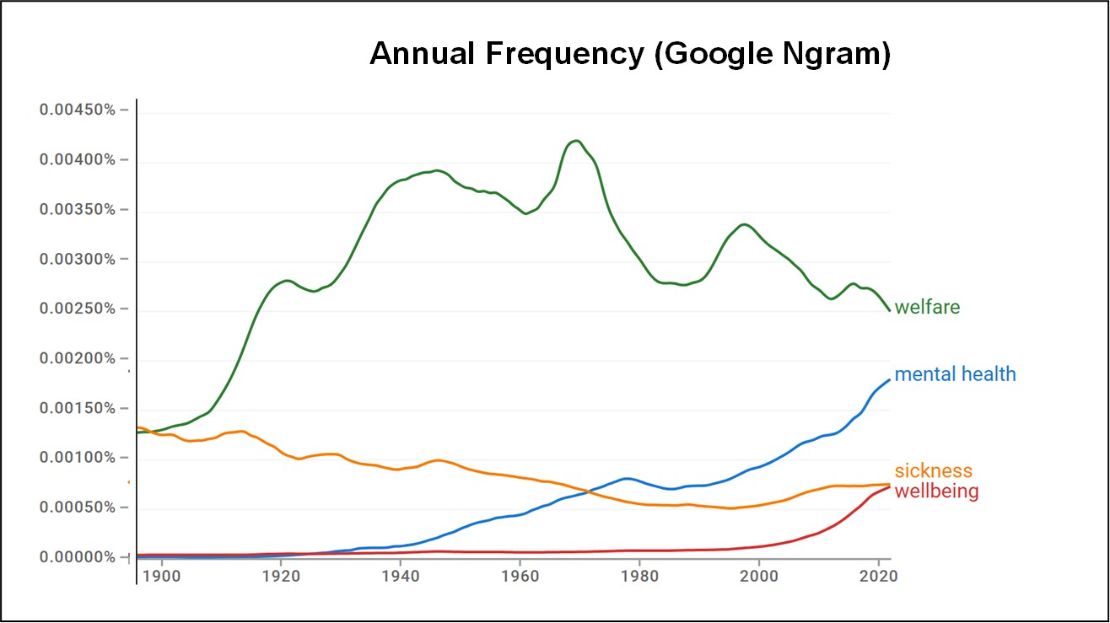
Let me throw out a hypothesis: what if our system not only tolerates mental illness but depends on it? What if, for every group of 20-30 people, one is implicitly elected as a “human lightning rod,” absorbing the collective stress and alienation from lives unfulfilled? This individual becomes the earthing device, enabling the rest of the group to function, insulated from the system's true cost on the human spirit. Enter the wellness industry, promising salvation yet perpetuating the very structures that demand these sacrifices.

The Spectacular Rise of the "Mental Health" Narrative
The "mental health" narrative has experienced a spectacular rise in recent years, transforming from a largely marginalized issue to a central topic in both public discourse and organizational strategy. A study analyzing Twitter data from 2012 to 2018 revealed that mentions of "mental health" increased nearly 100-fold, reflecting a significant surge in public conversation (arXiv). This trend is mirrored in the workplace, where 52% of employees report feeling burned out, a 9% increase since the pre-pandemic era (EveryoneSocial). In healthcare, burnout has escalated even further, with 46% of health workers reporting frequent burnout in 2022, compared to 32% in 2018 (CDC). The economic impact is equally stark, with employees experiencing poor mental health taking nearly 12 days of unplanned absences annually—far more than their healthier counterparts (Gallup). As this growing awareness spreads, organizations have begun investing heavily in mental health initiatives, with global spending on well-being programs reaching $51 billion in 2022 (FT). The mental health market is projected to grow from $375.21 billion in 2022 to $532.86 billion by 2030, driven by the increasing demand for both traditional and digital mental health solutions, including a booming mental health apps sector expected to grow at a rate of 15.2% annually (Yahoo Finance, Grand View Research).
The Corporate Paradox: “See How Much We Love You”
As with the sudden rise of any discourse, it’s often wise to pause and peer beyond the surface, to ask what remains concealed and what shadows the narrative casts. When we gaze upon the "mental health" conversation through a more critical lens, we might find ourselves questioning the corporate world’s potentially very twisted logic: “We terrorize you with work that has become soulless, but when you burn out, we provide yoga classes. This shows we care, so you should turn to us for healing from the wounds we inflicted.” It’s akin to a mother dangling her child out of a window by the neck, declaring, “See how much I love you.” The system’s “love” demands gratitude, even as it keeps us teetering on the edge.
This is not merely irony; it’s a systemic function. By offering therapy and wellness initiatives, organizations maintain control over the narrative of healing, ensuring that the terrorized return to their tormentors for relief. The same logic applies to society’s handling of violence, channeling it into criminal behavior to justify state violence in return. It’s a feedback loop that keeps the system humming.
From a Lacanian perspective, the increasing focus on mental health reflects profound psychological dynamics tied to modernity.
- Desire and Lack: Modernity creates a pervasive sense of lack—an absence of community, meaning, and purpose. The mental health narrative fills this void, offering a framework to articulate and address our discontent, but it risks becoming a superficial balm that conceals deeper structural wounds.
- The Real and Trauma: Lacan’s “real” refers to experiences so traumatic they resist articulation. The mental health narrative attempts to confront this trauma but often reduces it to clinical categories, stripping away the richness of human suffering and its potential for existential growth.
- The Function of the Other: Society’s recognition (or lack thereof) of mental struggles shapes our self-perception. As mental health becomes more visible, it reshapes societal expectations, but it also risks creating a culture where every emotional experience is pathologized.
Who Benefits?
The rising mental health narrative serves several stakeholders:
- Corporations: By offering wellness programs, companies appear compassionate while avoiding accountability for the stress they cause. The narrative shifts responsibility from systemic change to individual resilience.
- Wellness Industries: These sectors profit immensely, commodifying therapy, mindfulness, and self-help into billion-dollar markets. Mental health becomes a consumer product, not a societal priority.
- Governments: Framing mental health as an individual issue diverts attention from systemic inequalities that fuel distress, allowing structural injustices to persist unchallenged.
What Is Lost?
As the mental health narrative ascends, other narratives are crowded out:
- Existential Narratives: Traditional views that see suffering as a gateway to self-awareness and growth are sidelined. The focus shifts to alleviating symptoms rather than engaging with the deeper questions of life.
- Moral Responsibility: The emphasis on understanding mental health as an interplay of factors—biological, psychological, environmental—can diminish discussions of moral and collective responsibility. How do we balance compassion with the need to foster accountability, both individually and systemically?
- Community Solutions: Individualized approaches overshadow communal or cultural frameworks of healing, which often address the root causes of distress more effectively.
The Need for a Moral Reckoning
To truly address mental health, we must reconnect with moral discourse. This means:
- Resilience with Depth: Promoting virtues like courage and integrity alongside compassion, recognizing the interplay between individual growth and communal support.
- Systemic Accountability: Addressing the root causes of distress—economic inequality, workplace exploitation, social isolation—rather than merely treating symptoms.
- Redefining Success: Shifting from a profit-driven model to one focused on human flourishing, where work and society cultivate meaning and purpose.
The current mental health narrative, while vital, is insufficient. It risks becoming a tool of the very systems that cause distress, perpetuating a cycle of harm disguised as care. To move forward, we must balance compassion with a deeper engagement with moral, existential, and systemic dimensions. Only then can we create a society where mental health is not a coping mechanism for systemic dysfunction but a reflection of genuine human flourishing.
Inspired by: Cooper, Dialectics of Liberation, https://www.versobooks.com/products/89-the-dialectics-of-liberation?srsltid=AfmBOoqmcyYulxT5Ey5vbcg-A0K8iJPyT7I-TvQ0ogB3kfZDDK76j8_J

Popular articles in the KnowledgeHub: Critical Thinking




 .
.